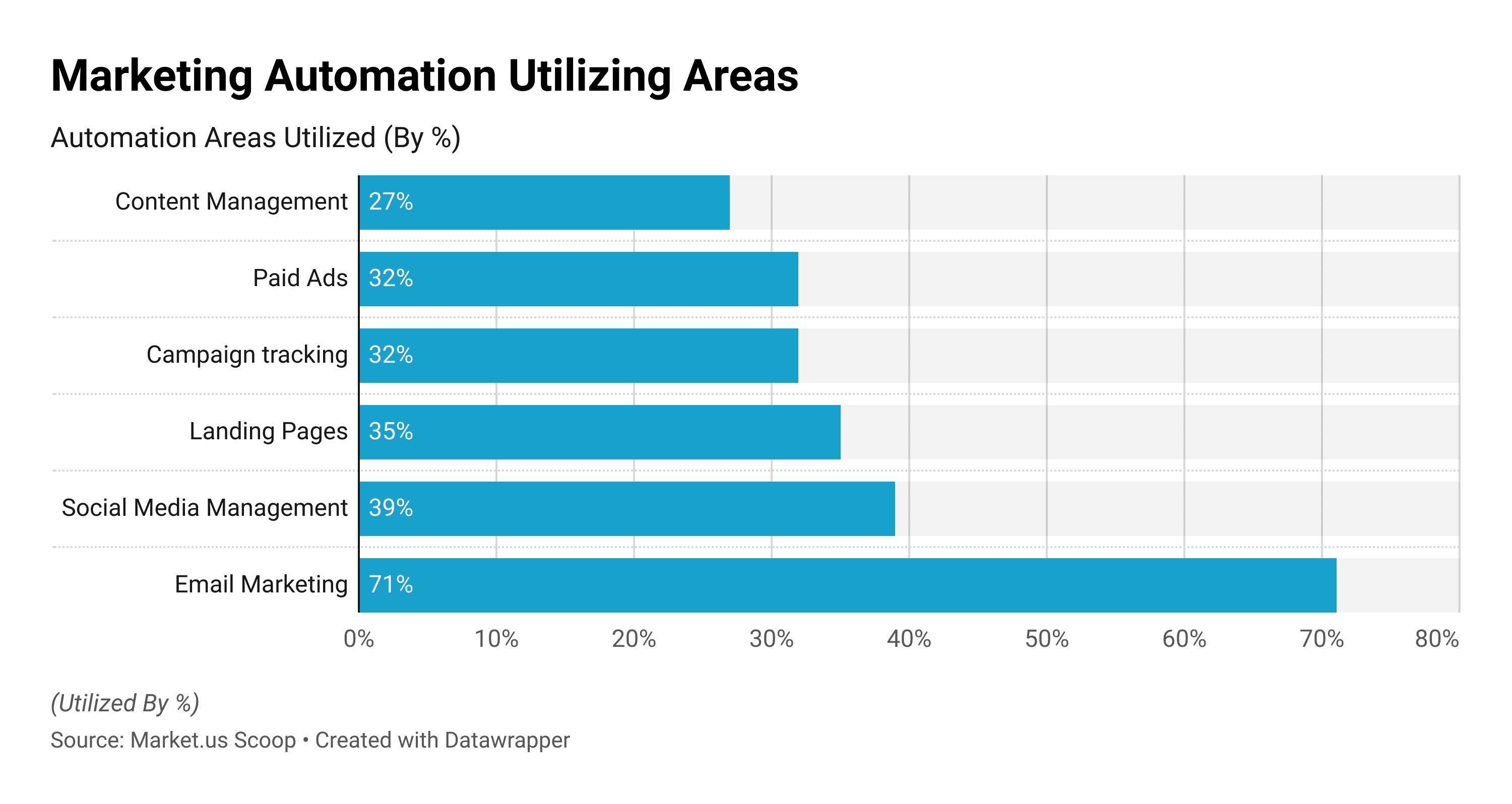Table of Contents
According to Market.us, by 2023, the global Marketing Automation Market is expected to generate revenue of nearly 5,9 billion US Dollars. This value will more than double to $13.7 billion by 2030.
General Marketing Automation Stats & Facts
The global advertising automation technology market is expected to be worth $25.1 billion by the end of 2023.
According to Marketing Automation Statistics, In 2017, the global market for marketing automation was worth $11.4 billion. Marketers gradually recognized the benefits of marketing automation, and investments grew at a $2 billion per year rate, reaching $15.6 billion by the end of 2019.
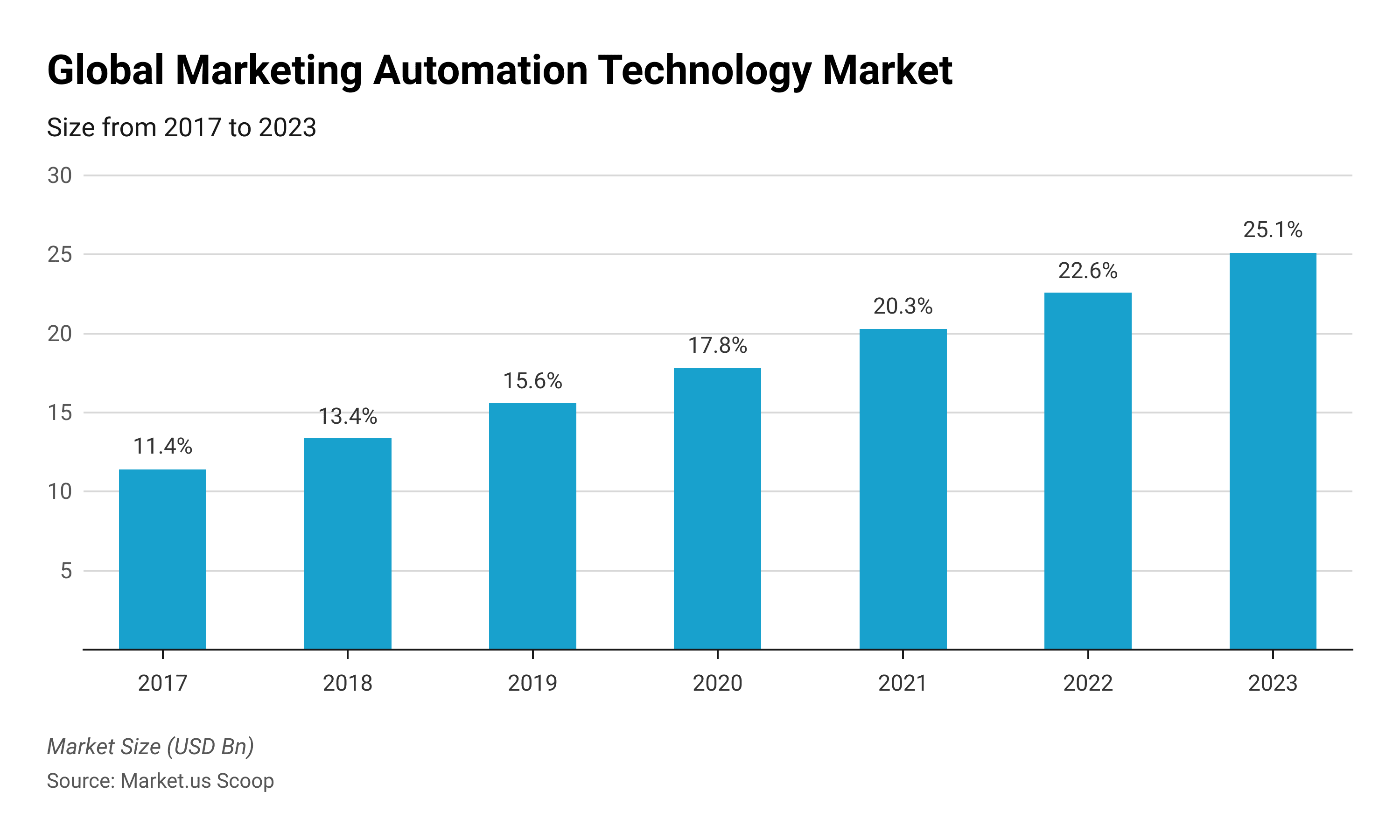
Marketing automation statistics show that three-quarters of businesses use some form of automation tool.
Marketing automation tools, according to data, have allowed 75% of businesses to focus on more important issues. Only a quarter of businesses do not have a marketing automation strategy in place.
Marketing automation software is viewed as “essential” by 91% of marketers.
Recent marketing automation statistics show that the vast majority (91%) of marketers recognize the value and adaptability of such tools. Investing in automated marketing frees up valuable time in their hectic schedules, allowing them to focus on other critical aspects of their campaigns.
HubSpot is the world’s leading provider of marketing automation solutions.
HubSpot is the most widely used marketing automation solution. HubSpot is used by 29.51% of industry professionals worldwide. According to marketing automation industry statistics, Adobe Marketing Cloud ranks second with 12.11%, while Oracle Marketing Cloud ranks third with 8.63%. Active Campaign, Salesforce Pardot, Marketo, and other platforms are used all over the world.
Market Share of the Top Marketing Automation Solution Providers in the World
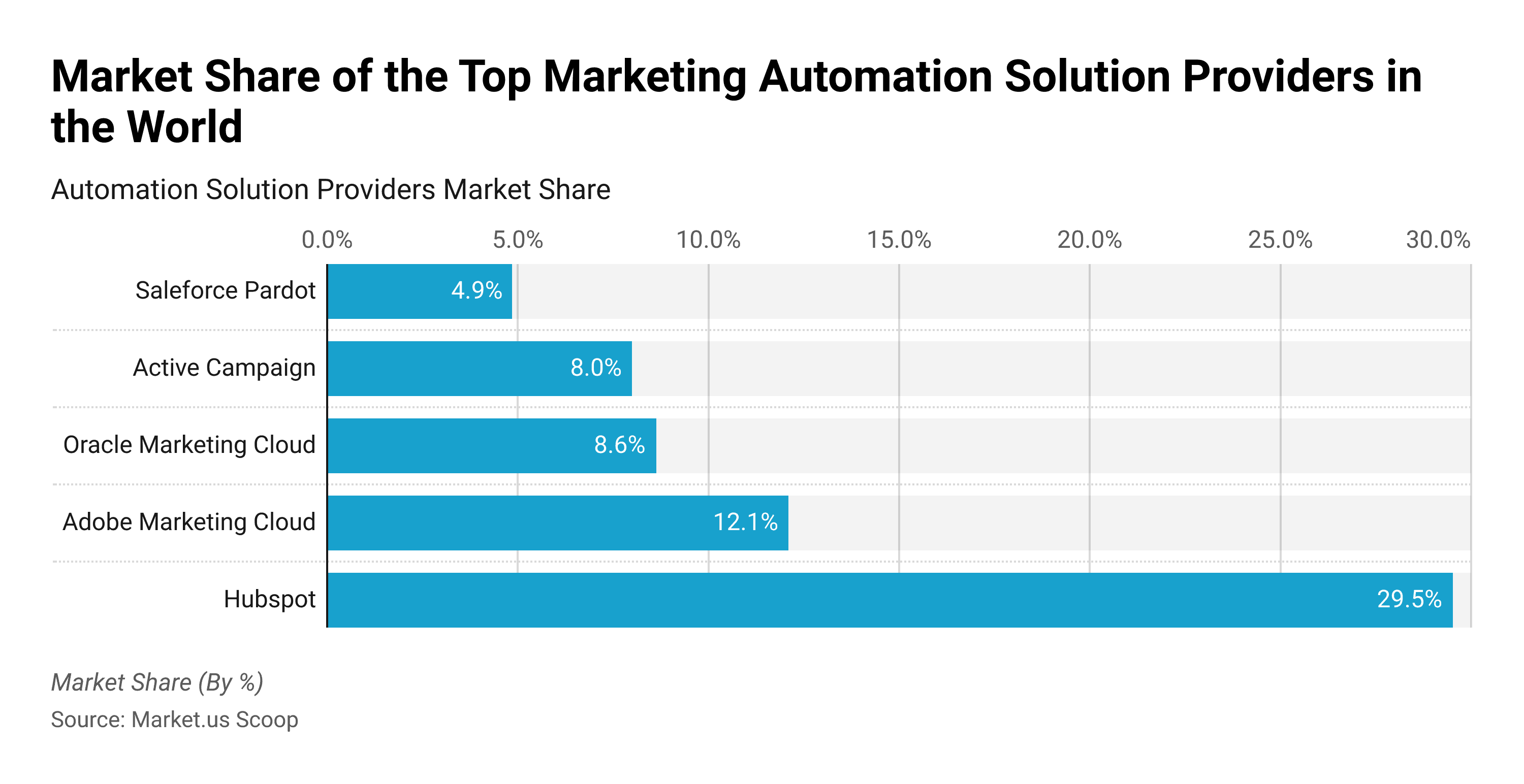
90% of marketers regularly use more than one type of marketing automation software.
Over 100 marketing automation platforms are available. This type of software has become so popular and effective that the vast majority of marketers, or a staggering 90%, now use at least one such tool on a regular basis, according to marketing automation statistics. So, if you’re one of the last few people who isn’t already utilizing campaign-saving automation tools, now is as good a time as any to begin your search.
40% of marketers who do not currently use marketing automation plan to do so in the near future.
According to marketing automation statistics, only about 10% of businesses that have not yet implemented marketing automation have no plans to do so. Meanwhile, nearly half are undecided about investing in such tools.
By 2026, the marketing automation software market is expected to be worth $19.66 billion.
Marketing automation software statistics show that the market for marketing automation software will grow from $6.87 billion in 2010 to $19.66 billion in 2026. The registered CAGR will be 19.2% between 2021 and 2026. Marketing automation is becoming more popular as the value of marketing in driving sales and retaining customers grows. One of the most rapidly expanding industries is marketing automation software.
Over 60% of businesses outsource all or a portion of their marketing automation strategy planning.
According to marketing automation statistics, 37% of businesses today rely solely on in-house resources for this aspect of their operations. 12% would rather hire a specialist to handle this. According to industry trends, more than half (51%) of companies choose to combine in-house and outsourced resources for the task. Then, 11% of businesses believe marketing automation is too expensive, while 22% believe it is expensive but worthwhile. Nearly half of users (47%) believe the price is reasonable, and 10% believe it is not at all expensive.
More than six in ten marketers intend to increase their marketing automation budget for the coming year.
According to the most recent marketing automation trends, satisfaction with using automation processes in marketing campaigns is increasing. Marketers adore this type of marketing because it saves time, increases customer engagement, allows for more timely communication, and, most importantly, provides better opportunities for both parties. As a result, 63% of marketers plan to invest more money in developing a more powerful automation strategy.
Marketing Automation Benefits
Marketing automation generates 451% more qualified leads.
Lead generation has always been one of the most desired marketing automation outcomes. According to sales automation statistics, businesses that use marketing automation software generate twice as many leads as those that only use blast email software. Using sales marketing automation software provides prospective customers with the information they need not only to move down the sales funnel but also to make a purchasing decision. In other words, it shortens the sales cycle.
61% of marketers use marketing automation to generate more leads.
For the majority of marketers (61%), the primary goal of using automation in marketing is to generate more leads. Marketers are using marketing automation to maintain leads (57%), increase sales revenue (47%), improve retention rates (36%), and increase marketing productivity (29%), according to automation statistics. Automated marketing campaigns, according to 28% of marketers, improve campaign measurability.
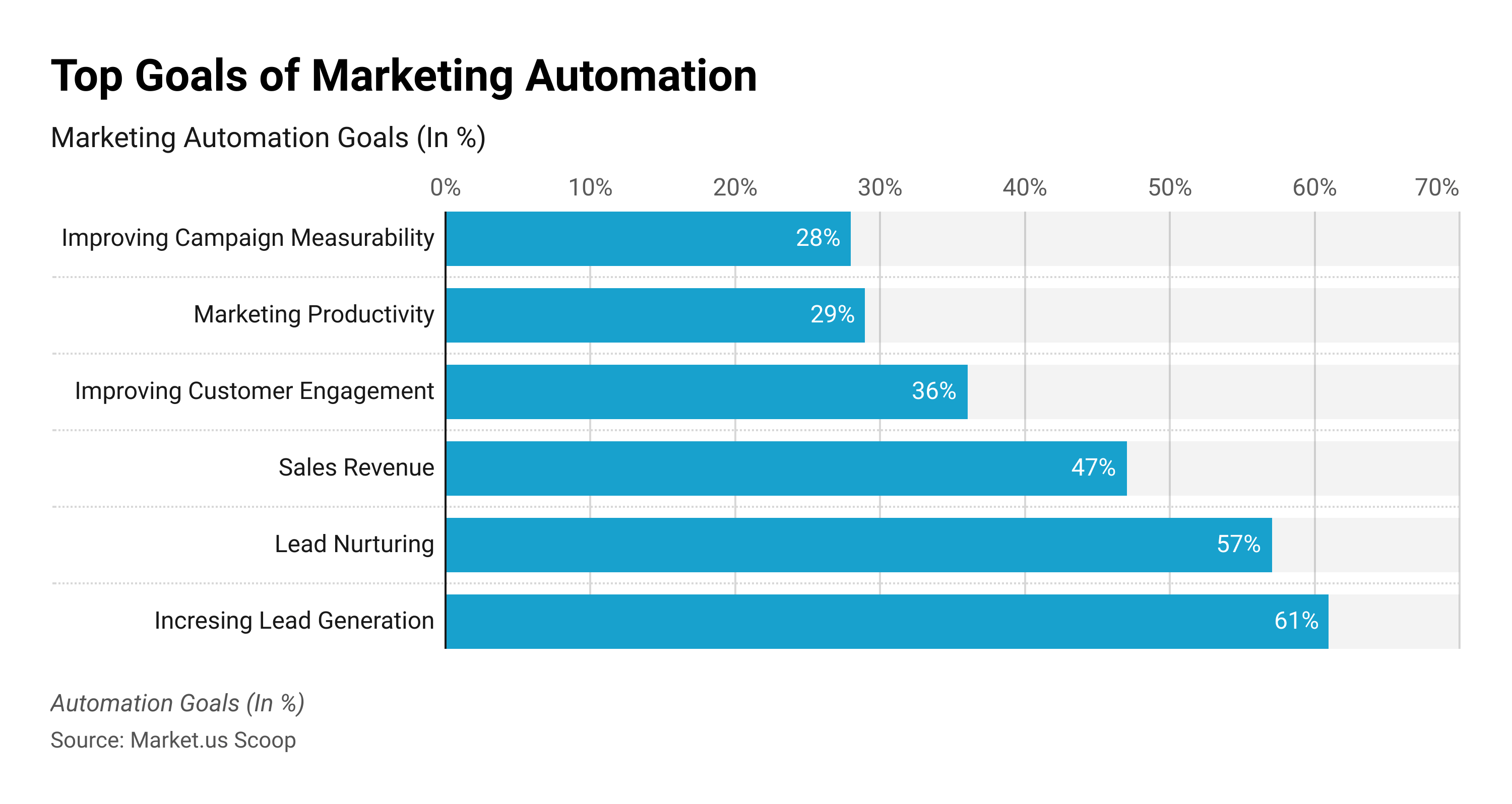
According to 74% of marketers, the most significant benefit of automation software is time savings.
While time savings is a significant benefit of marketing automation, it is far from the only one, according to nearly all marketers (74%). According to data from marketing automation, 68% of marketers believe marketing automation has a direct impact on customer engagement. Another direct benefit mentioned by 58% is improved customer communication. Finally, the same percentage (58%) reports that upselling, along with opportunities, is one of the most valuable outcomes of using marketing automation tools.
When you automate your lead management, you can increase your revenue by 10% in 6-9 months.
Businesses that use an automated marketing solution to manage leads see a 10+% increase in revenue within 6-9 months of implementing it, according to marketing automation ROI data. A single advertising platform can, on average, replace the time-consuming task of ten people working full-time to categorize every 1,000 leads.
Marketing automation is the most important factor in the success of nearly 80% of marketers.
According to marketing automation ROI statistics, 44% of businesses that have fully automated their advertising procedures see overall ROI within the first six months, while 79% see results after a year. In addition to lead management, companies use open rate, click-through rate, and unsubscribe rate as key metrics to measure marketing automation ROI.
Statistics on the use of marketing automation
- Only 34% of the businesses surveyed use marketing automation to some extent.
- Marketing automation is widely used by 25% of the businesses polled.
- 28% of companies surveyed do not currently use it but plan to do so within the next two years.
- Only 13% of marketers use marketing automation at all.
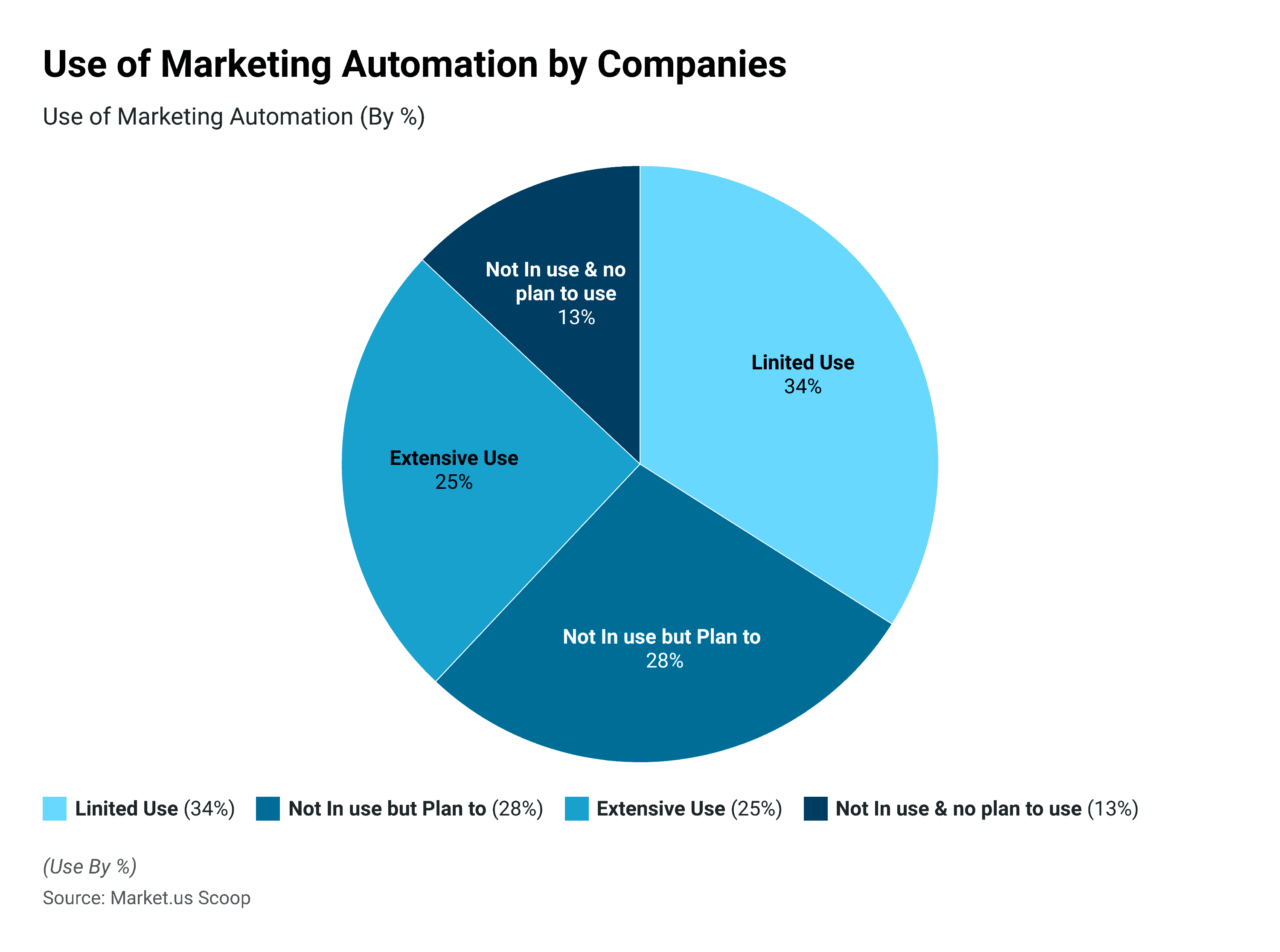
Business Processes That Make Use of Automation
- Marketing is the most automated business sector.
- 79% of businesses use automation for marketing, 45% for sales, and 33% for finance.
- 26% of those who do not currently use marketing automation intend to do so shortly.
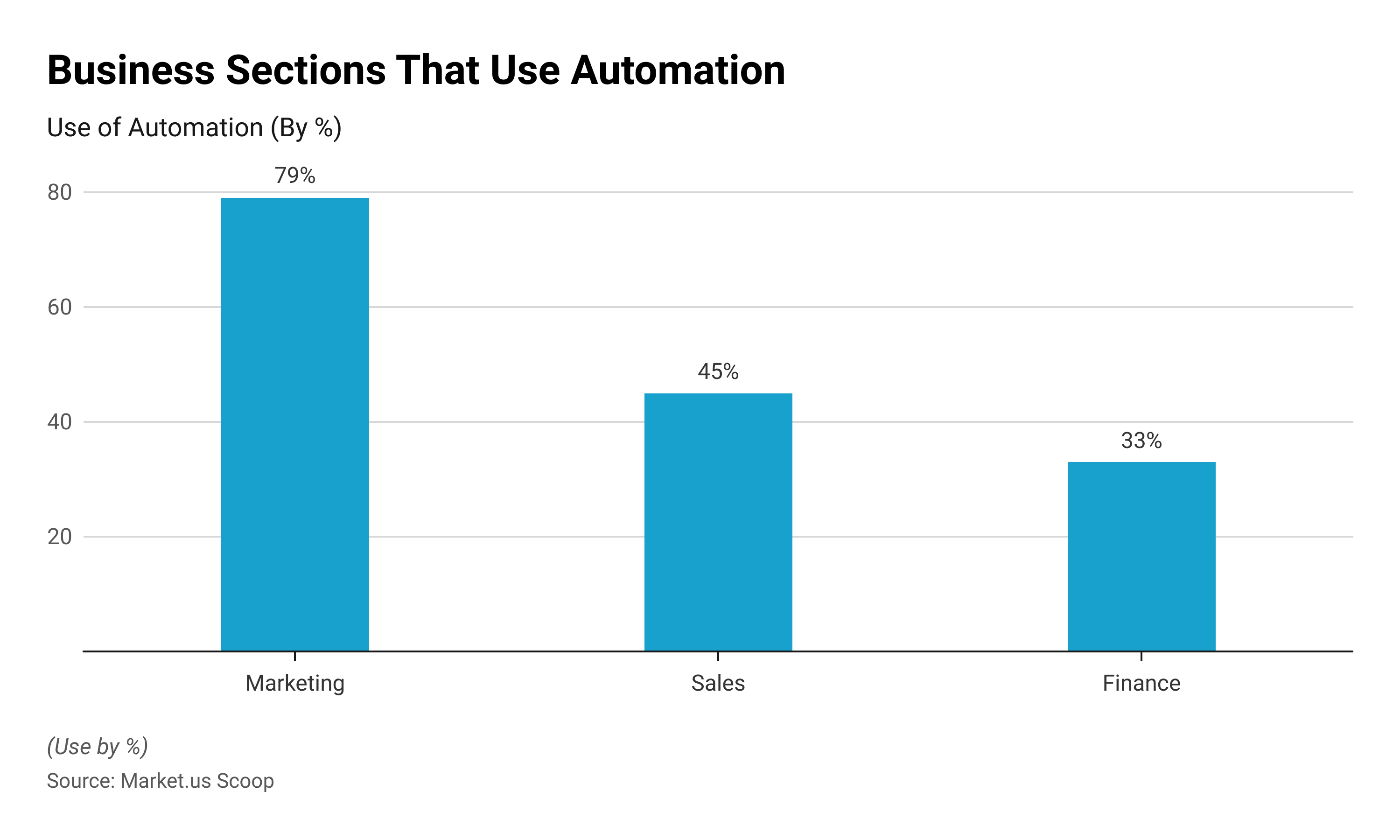
ROI of marketing automation statistics
Before investing in marketing automation, you’ll probably want to know what kind of returns to expect and when to expect them.
So, how does marketing automation pay off in terms of ROI? Let’s take a look at some numbers:
- In the first three years, marketing automation returns $5.44 on every dollar spent.
- On average, businesses recover the initial investment in automated advertising in less than six months.
- Marketing automation ROI is driven by increased sales productivity, increased campaign efficiency, improved prospect engagement, and cost savings.
B2B Marketing Automation Statistics
How do B2B companies differ from B2C companies when it comes to marketing automation? Let’s find out.
- In the United States, 59% of B2B marketing professionals believe that the most important features to look for when selecting marketing automation software are actionable analytics and reporting. Statista5 is the source.
- 71% of B2B marketers say they use automation in their email marketing efforts. This represents a six-point improvement over general marketing professionals.
- In the coming year, 39% of B2B companies intend to use marketing automation to assist with social media management.
